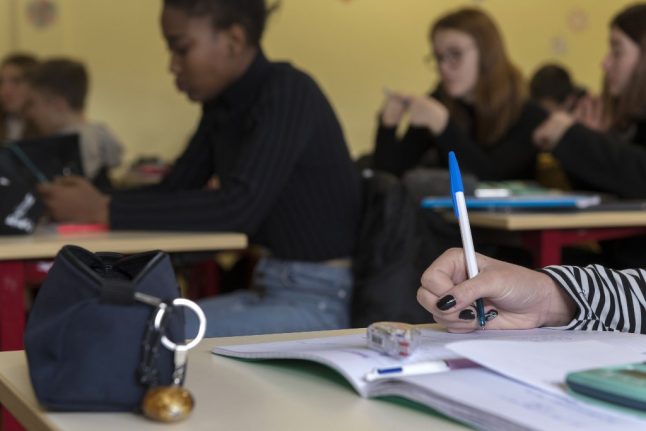After a recent study showed that about 80 percent of French people are embarrassed when speaking English, we wanted to find out exactly what the problems are for French people when it comes to learning languages. Is it just a lack of confidence or a more systemic problem?
READ MORE: ‘I feel ridiculous’ – Why French people dread speaking English
To our slight surprise, French schools begin their English education quite early, with a universal requirement of compulsory English lessons starting in 6eme (at the age of 11-12).
Many schools start the English training already in maternelle (nursery), when they are required to introduce a first foreign language (although the language does not have to be English).
We contacted the Education, Audiovisual and Culture Executive Agency (EACEA), which does research on foreign language skills across Europe for the European Commission, to ask if French children are really that bad at speaking English and – if so – why?
Here is what we found out.
1. It’s not a myth
The only study comparing foreign language levels in different European countries, the European Survey on Language Competences, found that French people are relatively bad at speaking English.
Although the study was conducted back in 2012, the EACEA said the results were still valid today, as national language skills take time to change.
The ESLC researchers found a large variation in foreign language proficiency across Europe. Sweden topped the ranking of the 14 countries taking part in the study, with a full 82 percent of students qualifying as “independent” English speakers.
France was at the bottom of the list of English speakers, with only 14 percent of students reaching an “independent” level.
(However British participants did even worse than French when tested in their most popular foreign language, Spanish).
READ ALSO The Paris school with no classrooms where pupils decide what to learn

French President Emmanuel Macron wants to improve English skills in France. Photo: AFP
2. Early is good, but..
So what explains the huge gap between France and Sweden?
The EACEA has identified several factors to explain the diverging levels of language skills levels across European countries.
France’s emphasis on an early, universal English education is quite recent. Although many French children start their English education earlier, learning English does not become compulsory before the 6ème grade (at 11).
Until 6ème schools may decide the language 'according to the available resources' (depending on their teachers' language skills). And resources can be a real problem, as older French teachers will not necessarily have the skills required to teach their children English properly.
Swedish children begin their training at seven, and have done so for years.
READ ALSO: What kind of school in France is best for my kids?
3. Structure matters
According the EACEA, the structure of the French education system is less continuous than for example the Swedish system.
In Sweden, children mostly do not switch schools between the ages of seven and 15. A French child moves from maternelle (nursery), to école primaire (primary school), to collège (secondary/middle school) to lycée (high school). Sometimes pupils don’t have the same English level, sometimes they change their language as they change schools.
Plus, French schools add a second foreign language when the children enter collège – in other words the same year English lessons become compulsory. So while Swedish pupils are only learning English for several years, French children are learning two languages at the same time.
EXPLAINED: What languages do children learn in French schools?
4. Environment matters
Some of the language skills gap between countries like Sweden and France must be explained by what happens outside the classroom.
Environmental factors play a crucial role when it comes to foreign language skills, according to the European Survey of Language Competences (ESLC).
Swedish children are immersed in English from a very early age. TV-channels and cinemas subtitle English shows and movies instead of dubbing them. French children, on the other hand, are used to TV shows being doublé (dubbed).
This is key in explaining why children in Swedish excel in English, according to the the ESLC study, which, although it was not the first to highlight environment as an important factor in explaining variations in language skills, was the firs scientific study to prove it.
It also explains why Swedish children, fluent in English from an early age, were not doing well when tested in Spanish (their second foreign language).



 Please whitelist us to continue reading.
Please whitelist us to continue reading.
Member comments